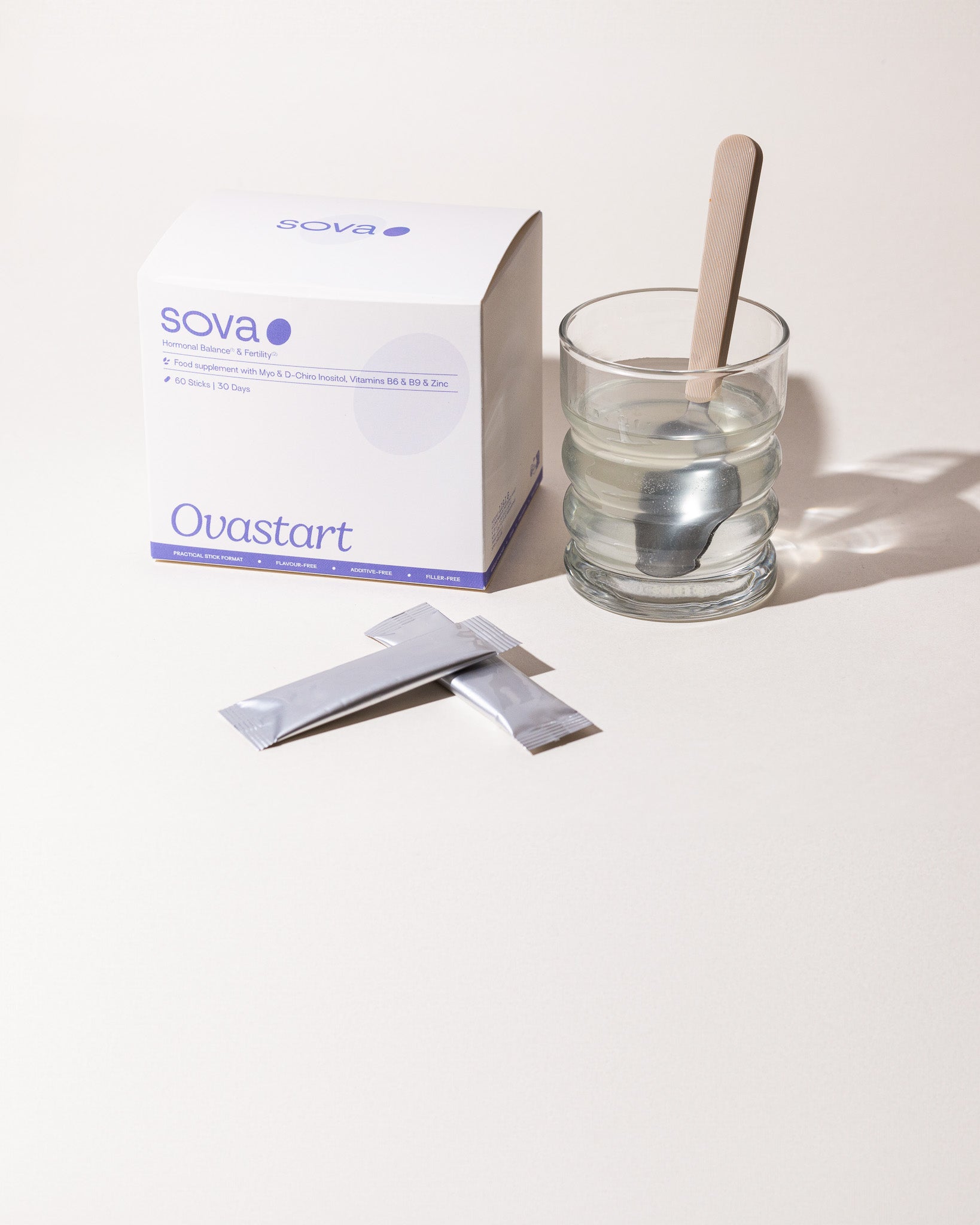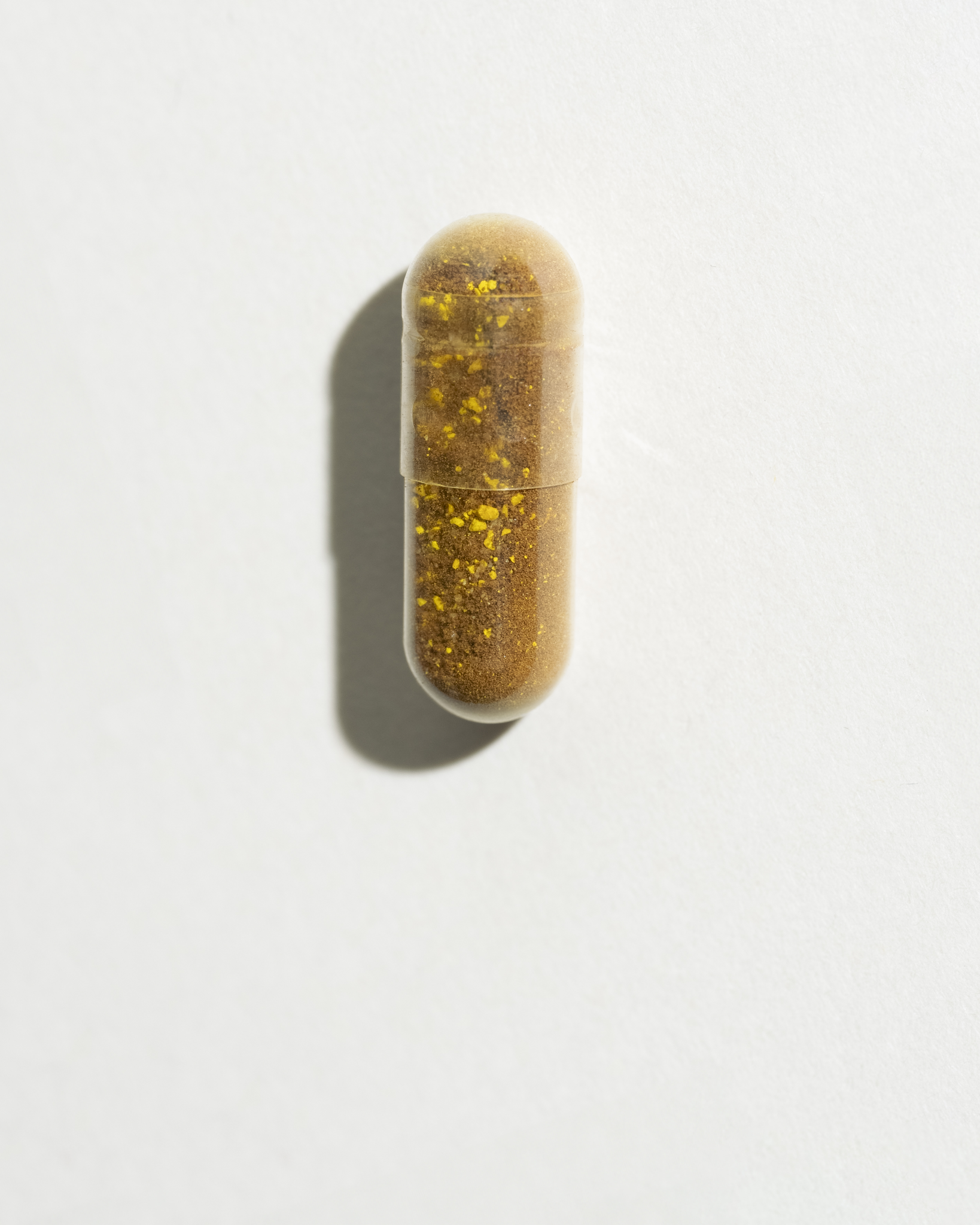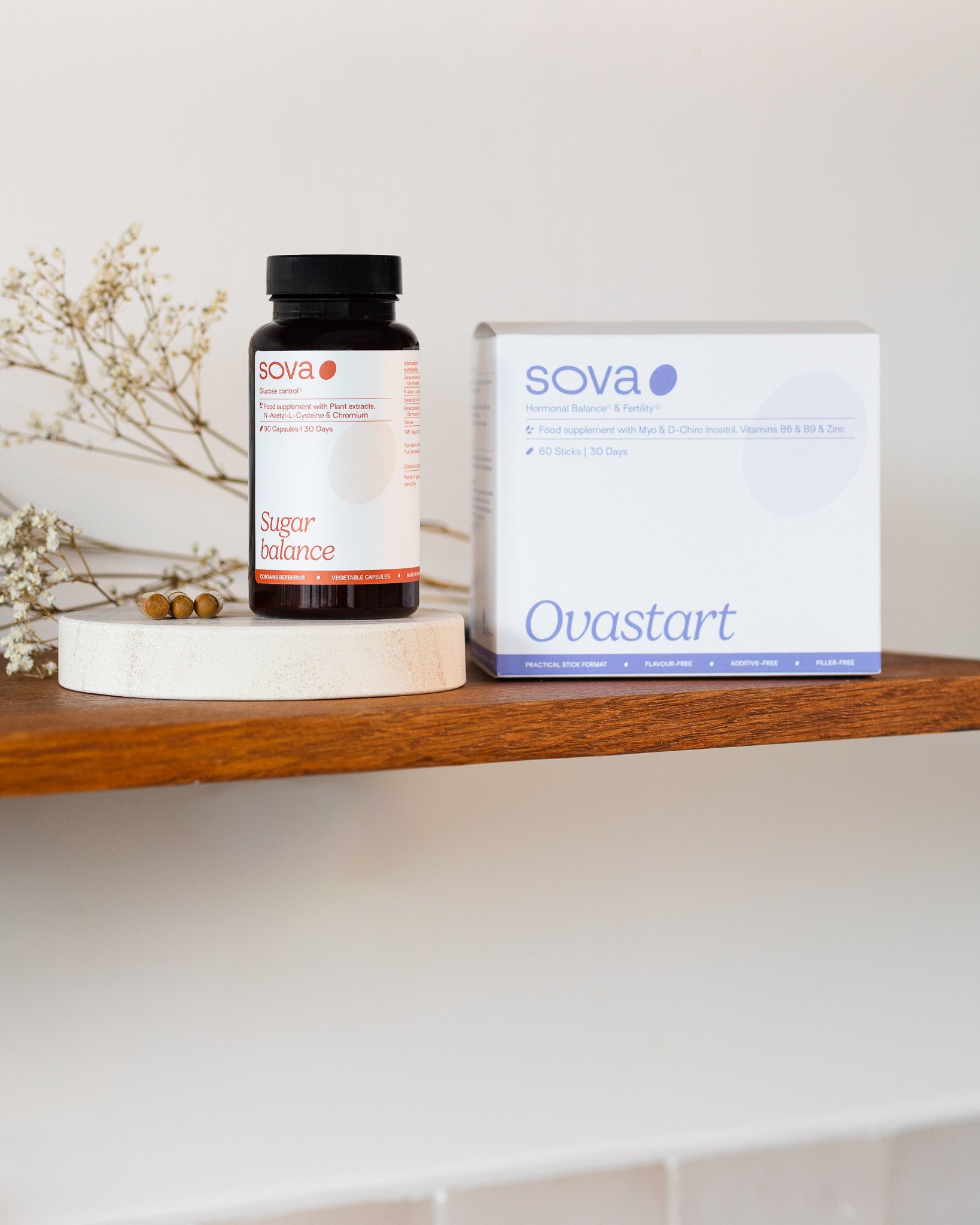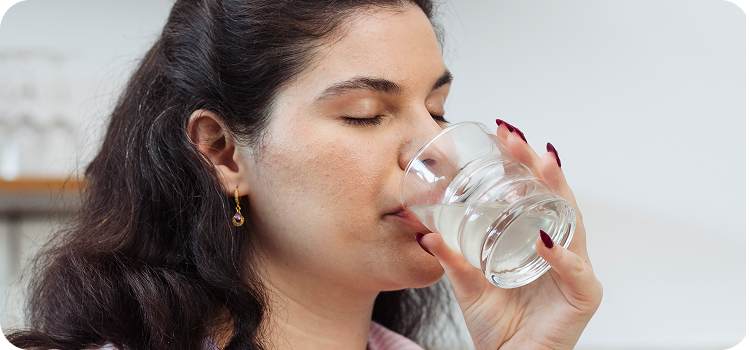Table of contents
Whether you’ve already been diagnosed with PCOS or you’re experiencing symptoms that make you suspect you might have it, choosing the right healthcare professionals to help you restore your well-being can often feel like a daunting task! 😵💫
If you’re feeling a bit overwhelmed by the information you’ve already encountered, that’s perfectly normal – we’ve been there too! 😉
That’s why, at SOVA, we’ve created this special guide to help you find which healthcare practitioners to consult if you suspect or have been diagnosed with PCOS. We’ll also explain why.
The first part of the guide focuses on your medical team, consisting of conventional healthcare professionals who will help you establish a diagnosis (whether it’s PCOS or another condition) and provide ongoing care. In the second part, we introduce your “holistic team” of complementary health practitioners who can support you in managing symptoms on a daily basis and provide the psycho-emotional support you need.
💡 Tip: If you’re not sure which symptoms to prioritise right now, you can take our PCOS product quiz to get personalised recommendations and lifestyle tips based on your needs.
Your medical team
Several healthcare professionals can be part of your medical team, depending on your symptoms. Here, we introduce the following professionals: general practitioner (GP), gynaecologist/midwife, endocrinologist, dietitian/nutritionist, physiotherapist, psychiatrist, and psychologist (this is not an exhaustive list).
Your GP
You can start your medical journey by consulting your family doctor or general practitioner (GP). Some GPs are familiar with PCOS and can already order blood tests and an ultrasound if they see fit. They can also renew prescriptions for medications as needed.
In any case, it’s important to visit your GP to get a referral (which is essential for NHS coverage) to see a specialist, such as an endocrinologist.
Your GP will also receive copies of your test results to keep a record of your ongoing care.
Your gynaecologist or midwife
It’s crucial, whether you’ve been diagnosed with PCOS or not, to have regular gynaecological check-ups with a professional: whether that’s a GP who does gynaecological follow-ups, a gynaecologist, or a midwife, particularly for preventing diseases like breast cancer or cervical cancer. This follow-up is even more essential if you have symptoms like missed periods or lower abdominal pain.
Gynaecologists are specialists in women’s health, including reproductive health issues. They can order the necessary tests to diagnose PCOS, prescribe medications if needed, and provide long-term medical follow-up.
For effective follow-up, we suggest consulting a gynaecologist who specialises in fertility issues, including PCOS. At SOVA, we understand that working with the medical profession can sometimes be challenging, so to find supportive and well-trained professionals, we recommend checking Google reviews of the doctors you plan to visit – these often reflect their practice and personality.
You can also consult a midwife as they are fully trained in general gynaecological care, even outside of pregnancy. They can prescribe contraceptives, some medications, and provide gynaecological follow-up throughout your life. Although not all are well-versed in PCOS, you’ll often find that midwives offer longer consultation times, explain medical procedures in more detail (like gynaecological exams), and sometimes suggest less medicalised approaches (some are trained in techniques like hypnosis, acupuncture, or herbal medicine).
Your endocrinologist
An endocrinologist is a doctor who specialises in endocrinology, a branch of medicine that focuses on the hormonal system (the endocrine system). They are the specialists when it comes to your hormones! An endocrinologist diagnoses and treats hormonal and metabolic disorders, including those related to conditions like diabetes, thyroid disorders, growth issues, fertility problems, menstrual disorders, osteoporosis, and, of course, PCOS. (1)
Why choose an endocrinologist over a gynaecologist? Gynaecologists specialise primarily in the female reproductive system, so they can help if you’re looking to conceive or need standard gynaecological follow-up. Endocrinologists, on the other hand, are experts in the endocrine system, which covers both menstrual cycle-related symptoms and those related to metabolic issues (like insulin resistance or significant weight gain) as well as symptoms caused by excess male hormones (acne, hair loss, or alopecia). This makes endocrinologists the specialists in PCOS. (2)
They can order hormonal tests (blood tests) and an ultrasound to determine if you meet the criteria for a PCOS diagnosis. For a reminder, you can consult the diagnostic criteria here: What is PCOS?
They can also recommend appropriate treatments, which may include medications, hormone therapies, lifestyle changes, and other interventions.
As with gynaecologists, it’s best to seek out an endocrinologist who specialises in fertility issues, including PCOS, to receive care that closely matches your symptoms and needs.
Your dietitian/nutritionist
In the UK, there are two main professions specialising in nutrition: registered dietitians and nutritionists. Dietitians are trained professionals who generally complete a Bachelor’s degree that provides the necessary knowledge about specific nutritional needs for different populations. They are registered with the Health and Care Professions Council (HCPC), which ensures they meet high standards of practice and ethics. The second nutrition professional is the nutritionist, who doesn’t need to be registered nor have any specific training though some may be accredited and registered with particular associations.
Your dietitian
A dietitian is a health professional specializing in nutrition and dietetics. Their primary role is to help individuals balance their diet according to their specific needs, whether for health reasons, sports performance, weight loss, or other nutrition-related goals.
You can consult a dietitian on the NHS if referred by a medical professional 🙂. Once again, we encourage you to choose a dietitian who is trained in managing PCOS and is familiar with the unique needs of this complex condition.
The role of a dietitian is crucial in the management of PCOS, as they provide personalized advice on how to improve your diet to help manage the symptoms of this condition (4).
PCOS is often associated with metabolic issues such as insulin resistance, obesity, and hormonal fluctuations. Dietitians work closely with patients to develop tailored meal plans aimed at regulating weight, improving insulin sensitivity, and stabilizing hormone levels. They can also assist with dietary adjustments if you suffer from eating disorders, which is often the case with PCOS (5).
For tips on adapting your diet, see our guide: PCOS and diet – What are the “forbidden” foods? and consider pairing lifestyle changes with supportive supplements like Sugar Balance.
Doctors specialising in nutrition
You might also choose to consult a doctor specialising in nutritional medicine to advise and educate yourself on how your diet can affect your health. They can work in various settings, including private practice, hospitals and clinics. They are often involved in the prevention and management of health conditions through diet. If you choose one trained in PCOS, they will be able to provide dietary advice tailored to the syndrome and your symptoms. They may also recommend certain supplements based on your individual needs and prescribe tests or medications if necessary.
For more information on the diet to adopt in case of PCOS, you can read our article Nutrition and PCOS: The key rules of a diet adapted to your type of PCOS.
Your Physiotherapist
PCOS can be accompanied by various types of pain that particularly affect the lower abdomen and lower back (related to local inflammation of the reproductive system). To learn more about the links between inflammation and PCOS, you can read our article: Polycystic Ovary Syndrome (PCOS) Inflammatory: Explanations & Tips.
There are also physiotherapists who specialise in pelvic pain, perineal pain, or pain during sexual intercourse.
You might also experience postural pain linked to significant weight gain (6). In such cases, it may be helpful to consult a physiotherapist who can assist you in alleviating this pain. As with an endocrinologist, you'll need to get a referral from your GP to access physiotherapy sessions.
Physiotherapists use a variety of techniques and physical exercises to help patients recover or improve mobility (such as rehabilitation after surgery), muscle strength, endurance, and overall functionality. They often collaborate with other healthcare professionals, such as doctors, nurses, and occupational therapists, to develop comprehensive treatment plans. A physiotherapist can help you reintroduce physical exercises into your daily routine to get moving again, facilitate weight loss if necessary, and, most importantly, relieve your pain. (7) You can also benefit from therapeutic massages to reduce pain and restore mobility (for example, if your back is stiff 😉).
After pregnancy, physiotherapists, along with midwives, are the only professionals authorized to perform pelvic floor rehab, which is often necessary to prevent urinary incontinence, restore muscle tone, and prevent future organ prolapse.
Your Psychiatrist or Psychologist
PCOS is often accompanied by symptoms related to stress and anxiety. If you’re experiencing this as well, we strongly encourage you to seek support from a mental health professional 🙏 (for more information on PCOS symptoms, you can read our article Symptoms Associated with Polycystic Ovary Syndrome. In the UK, there are different types of mental health professionals who specialize in managing mental health issues: psychiatrists, psychologists, psychotherapists, and mental health nurses.
Your psychiatrist
Psychiatrists are medical doctors who specialize in psychiatry, the branch of medicine that deals with mental health disorders. Because they are medical doctors, psychiatrists can prescribe medications and have extensive medical training on mental health conditions and their overall impact on health.
They can also provide therapeutic approaches (such as talk therapy), including psychoanalysis (an intensive form of talk therapy that can span several years), alongside medication management. This specialist may be a good fit for you if your anxiety significantly impacts your daily life and you might benefit from taking medication for relief.
Your psychologist
Psychologists have completed university studies in psychology to doctorate level, but they are not medical doctors. They are trained in the assessment and treatment of psychological aspects of human behavior. Psychologists typically use talk therapies (often short-term) and other psychological techniques, but they cannot prescribe medication.
We recommend consulting a psychologist if your anxiety or mood issues do not require medication, or if you prefer to focus on therapy through conversation.
Your psychotherapist
Psychotherapists are professionals who have completed specialized training in psychotherapy, which focuses on helping people understand and manage their mental health challenges through talking therapy. They may have a background in psychology, social work, or counseling. Psychotherapists usually work in private practice or community mental health settings.
Unlike psychiatrists, psychotherapists are not authorized to prescribe medications in France.
Your "holistic" team
A holistic approach to health aims to understand and treat the person as a whole, recognizing the interconnection of various dimensions of their being: physical, mental, emotional, and social aspects. This approach involves several health professions that we call complementary because, at SOVA, we believe that both medical and holistic approaches are necessary to provide complete care for PCOS.
In this part of the article, we’ll introduce you to some of the most relevant professions: osteopaths, naturopaths, sophrologists, acupuncturists, reflexologists, and personal trainers (this list is not exhaustive).
Your osteopath
Osteopathy is a therapeutic approach that focuses on manual manipulation of the musculoskeletal system (muscles and bones) to improve the overall health of the body. Osteopaths view the human body as a functional unit where all parts are interconnected and work together. The goal of osteopathy is to restore balance and mobility in the body to promote healing and relieve any potential pain.
In the UK, osteopathy is regulated and osteopaths must be registered with the General Osteopathic Council (GOsC). We recommend being cautious in choosing your practitioners and researching them before making an appointment (check their training and reviews).
Regarding the management of PCOS symptoms, studies have shown that a 45-minute to 1-hour osteopathy session every four months could improve the quality of life for patients. (8) You can consult an osteopath for joint, muscle, digestive pains, or even migraines. The osteopath can relieve certain physical areas and provide emotional support. By restoring mobility to these sore areas, they help reduce local inflammation. Osteopaths can also play a preventive role by recognising certain symptoms (such as acne or weight gain) and directing you to a health professional specialised in the medical management of PCOS.
This practice is different from and complementary to physiotherapy sessions.
Your naturopath
Naturopathy is a natural health approach that draws on both ancient knowledge of human functioning (traditional Western medicine) and modern medical studies and teachings (anatomy-physiology, nutrition, herbal medicine). Naturopathy is recognized by the WHO and European bodies as a form of non-conventional or traditional medicine.
The naturopath’s approach focuses on preventing ailments and illnesses through health education and empowering individuals, giving everyone the opportunity to become autonomous and take charge of their well-being. This support does not replace the follow-up by a general practitioner or specialist, and a naturopath’s advice should never substitute for a medically prescribed treatment.
The three main pillars of naturopathic support are: dietary changes, encouragement to resume physical activity, and psycho-emotional support. A naturopath tailors their advice to the individual’s needs and circumstances. They may also recommend targeted supplements if deemed appropriate. If you have PCOS, it’s well worth consulting a naturopath as their holistic approach integrates well with traditional medical follow-up. Moreover, some studies have shown that holistic naturopathic care can positively impact PCOS symptoms, especially when combined with practices like yoga. (10)
However, be cautious when choosing a practitioner: in the UK, naturopathy is not regulated. To ensure the quality of your naturopath’s training, I recommend consulting the directories of professional associations. We also advise seeking out a practitioner specialising in fertility or cycle-related issues who is trained in supporting PCOS.
Another word of caution: avoid expensive programs that promise miracles with your PCOS (cure). Remember, this is a chronic condition that you will need to learn to live with, all while alleviating your symptoms.
If you work with one, ask about supplements designed for hormonal balance like Ovastart or combined routines like our Balance Bundle for both cycle and metabolic support.
Your sophrologist
Sophrology is a mind-body method designed to restore balance between the body and mind with the goal of improving overall well-being. Sophrology offers a set of relaxation techniques aimed at achieving this balance. The three main techniques often practiced in sophrology are: breathing exercises (e.g., belly breathing where exhalations are longer than inhalations), positive mental visualisation (associating positive mental images with emotions), and dynamic relaxation (gentle body movements). Sophrology sessions are usually conducted sitting or standing (not lying down) and can be done individually or in groups.
The reasons for consulting a sophrologist can vary widely, such as: physical or mental well-being, the need for relaxation, pain or illness management, confidence building, support during pregnancy, preparation for an event/competition/exam, sleep issues, stress management, or emotional regulation.
The value of sophrology in managing your PCOS symptoms lies in its ability to address multiple factors: pain management, building self-confidence, and acceptance (learning to live better with the syndrome through compassionate listening). (8) You can practice sophrology using free videos on YouTube or apps like Headspace or Balance, for example. However, we recommend starting with guidance from a sophrologist to learn the basics. Sessions can then be spaced out until you become fully autonomous and can practice on your own at home, according to your needs.
Again, this profession is not regulated, so to ensure you're working with a quality professional, do your research beforehand (check their Google profile, website, or social media). Additionally, if you’re already working with an osteopath or naturopath, they can guide you toward other trusted professionals.
Your acupuncturist
Acupuncture is a practice rooted in traditional Chinese medicine that involves inserting fine needles into specific points on the body to stimulate vital energy (known as "qi" or "chi") and restore balance. This method offers a holistic approach that addresses both physical and psychological aspects. These sessions can also be part of a broader traditional Chinese medicine treatment plan. Some women with PCOS have explored acupuncture as a complementary option to manage their symptoms.
Although research on the effectiveness of acupuncture for PCOS is limited, some studies suggest that acupuncture may help regulate reproductive hormone levels, improve ovarian function, and potentially enhance fertility in women with PCOS. These studies also indicate that acupuncture might reduce insulin resistance, address metabolic issues (such as fat regulation), and improve mood. (11)
While this method may help relieve your symptoms, as with many natural approaches, we strongly recommend consulting medical professionals and maintaining regular medical follow-up. Once again, we encourage you to research the acupuncturist you choose and prioritise practitioners recommended by other healthcare providers, your doctor, or trusted individuals in your circle.
Your reflexologist
Reflexology is a therapy based on the idea that specific areas of the feet, hands, and ears (called reflex zones) are connected to certain organs and systems in the body. By stimulating these reflex zones through manual pressure or tools (such as needles, staples, or electrical detectors or finger for the ears), reflexology aims to promote overall balance, improve circulation, and enhance general well-being. (12)
There is limited research on the impact of reflexology on PCOS symptoms. However, some studies have shown that reflexology, particularly foot reflexology, can improve ovulation and thus fertility. (13) Despite the lack of extensive scientific evidence on the relevance of reflexology for PCOS, most studies on foot reflexology have demonstrated its effectiveness in reducing pain, including headaches, back pain, joint pain, post-cesarean pain, acute pain in infants, pregnancy-related pain, and labor pain. (14)
Therefore, this practice may be beneficial for you, especially in reducing pain and improving your overall well-being.
Your personal trainers
Here, we’re not referring to gym trainers who may not be trained to handle conditions like PCOS or related hormonal and metabolic disorders.
Instead, we're talking about personal trainers who come to your home or guide you via video sessions. These trainers can tailor their advice to your specific needs, rather than providing a one-size-fits-all program like those typically offered at gyms. Once again, choose your trainer carefully—some trainers specialise in PCOS support, and if you search for "PCOS coach," you may find them on platforms like Facebook or Instagram.
Here’s how a personal trainer could help you manage your PCOS. A personal trainer can design an exercise program tailored to your specific needs. This might include cardiovascular exercises, strength training, and flexibility-focused activities. A trainer can help you develop exercise and nutrition strategies (if they’re trained in that area) to support healthy weight management (whether you need to lose weight or struggle to gain it). The trainer can also collaborate with other healthcare professionals to develop a holistic fitness plan tailored to your individual profile.
Additionally, many studies have shown the benefits of regular physical activity in managing PCOS symptoms, including improved insulin sensitivity (15), support for fertility, and better stress and emotion management. (16)
The importance of getting support
As a final thought, at SOVA, we are convinced that a holistic approach—encompassing the medical, emotional, and social aspects of PCOS—plays a key role in your overall well-being and symptom improvement. Consulting and following the advice of specialised medical professionals is essential for understanding the different sides of PCOS and implementing a tailored treatment plan. Healthcare professionals are here to guide you, provide valuable information, and personalise a treatment plan that meets your specific needs.
We know that managing PCOS can be a source of anxiety and stress, but remember that you are not alone in this journey. You can count on the support of the SOVA community. 😉
💡 Need help figuring out where to start? Try our PCOS product quiz to get personalised supplement recommendations, exclusive offers, and expert tips.
Research is progressing, and we regularly discover new avenues for managing PCOS to help us live better with it. Keep the faith!
Scientific references
SOVA was created by two sisters with PCOS who wanted products that truly worked. Our formulas are developed in-house with women’s health and micronutrition experts, using ingredients backed by clinical studies and compliant with European regulations.
- Built by women with PCOS, we know the reality of the symptoms.
- Clinically studied, high-quality ingredients, including patented forms like Quatrefolic® and an optimal Myo-/D-Chiro Inositol ratio.
- Holistic support for hormonal balance, metabolic health, inflammation, mood and cycle regulation.
- Transparent, science-led formulas with no unnecessary additives.

















